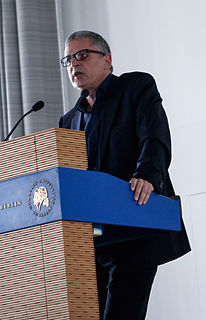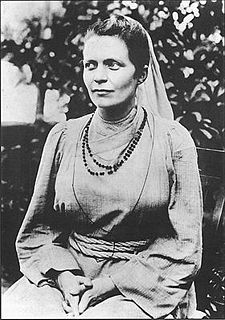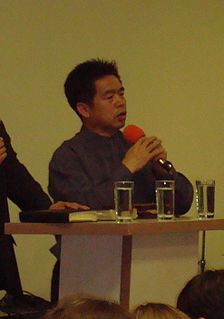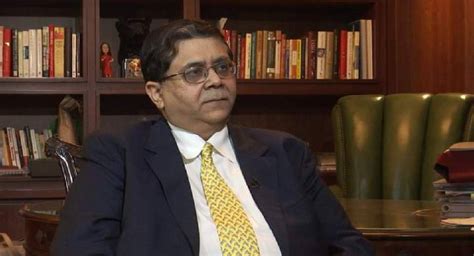Top 173 Hinduism Quotes & Sayings - Page 3
Explore popular Hinduism quotes.
Last updated on April 16, 2025.
Yoga is a product of Eastern thought. A further complication is that the early Yoga teachers were both Indian and Hindu. So from the late 1800's and early 1900's the Yoga teachers who came across were as interested in Hinduism as in Yoga. Often what we were being taught was a mixture of two different systems.
I know that Arnold Toynby, the great historian, said he had always hoped the religions of the world would evolve until they began to bring the very best of each tradition into one tradition. He hoped that Christianity would be the one religion that finally incorporated the values of Hinduism and Buddhism, and enriched itself with them.
Hinduism, Confucianism, and Buddhism are huge traditions of enormous importance, and they aren't monotheistic. Again, this reflects the fact that our preconceptions about what religion is are so influenced by Protestantism - either real Protestantism or the secularized Protestantism that dominates our culture - and its assumption that beliefs are the most important thing.
Hinduism... gave itself no name, because it set itself no sectarian limits; it claimed no universal adhesion, asserted no sole infallible dogma, set up no single narrow path or gate of salvation; it was less a creed or cult than a continuously enlarging tradition of the Godward endeavour of the human spirit. An immense many-sided many-staged provision for a spiritual self-building and self-finding, it had some right to speak of itself by the only name it knew, the eternal religion, Sanatana Dharma.
The cartoonists treated Islam the same way they treat Christianity, Buddhism, Hinduism and other religions. And by treating Muslims in Denmark as equals they made a point: we are integrating you into the Danish tradition of satire because you are part of our society, not strangers. The cartoons are including, rather than excluding, Muslims.
Really, whatever I was seeking and looking into in those days like creative arts, chant, the muse being in touch with the muse for poetry and writing and music. It's all part of the spirit and if we look particularly at Hinduism and Buddhism, the tantric stream of those traditions totally embraces all aspects of human life and life on this world.
I came to the conclusion long ago that all religions were true and that also that all had some error in them, and while I hold by my own religion, I should hold other religions as dear as Hinduism. So we can only pray, if we were Hindus, not that a Christian should become a Hindu; but our innermost prayer should be that a Hindu should become a better Hindu, a Muslim a better Muslim, and a Christian a better Christian.
Did Buddha teach that the many was real and the ego unreal, while orthodox Hinduism regards the One as the real, and the many as unreal?" the Swami was asked. "Yes", answered the Swami. "And what Ramakrishna Paramahamsa and I have added to this is, that the Many and the One are the same Reality, perceived by the same mind at different times and in different attitudes.
Man has to create marriage because man is afraid of the unknown. On all levels of life and existence, man has created substitutes: for love there is marriage; for real religion there are sects - they are like marriages. Hinduism, Mohammedanism, Christianity, Jainism - they are not real religion. Real religion has no name; it is like love. But because love is dangerous and you are so afraid of the future, you would like to have some security. You believe more in insurance companies than in life. That's why you have created marriage.
Well, I would have to say as a Christian that I believe any belief system, any world view, whether its Zen Buddhism or Hinduism or dialectical materialism for that matter, Marxism, that keeps persons captive and keeps them from coming to faith in the Lord Jesus Christ, yes, is a demonstration of satanic power.
You can keep your own religion - Buddhism, Islam, Hinduism, Mormonism - you just need to add Jesus to the equation. Then you become complete. You become a Buddhist with Jesus, a Hindu with Jesus, a Muslim with Jesus and so on. You can throw out the term Christianity and still be a follower of Jesus. In fact, you can throw out the term Christian too. In some countries, you could be persecuted for calling yourself a Christian, and there is no need for that. Just ask Jesus into your heart, you don't have to identify yourself as a Christian.
I think that in the diaspora, and among immigrants, religion becomes a vehicle for the transmission of cultural information, and cultural codes, and this does end up re-inscribing certain things about the religion - like caste. Caste discrimination and hierarchy are still a very fundamental and violent part of Hinduism. My family was upper caste, and that was very clear. I feel like caste and religious practice are inextricable, actually.
I embraced Hinduism because it was the only religion in the world that is compatible with National Socialism. And the dream of my life is to integrate Hitlerism into the old Aryan Tradition, to show that it is really a resurgence of the original Tradition. It's not Indian, not European, but Indo-European. It comes from back to those days when the Aryans were one people near the North Pole. The Hyperborean Tradition.
Hinduism would not be eternal were it not constantly growing and spreading, and taking in new areas of experience. Precisely because it has this power of self addition and re-adaptation, in greater degree than any other religion that the world has even seen, we believe it to be the one immortal faith.
As my personal explorations continued, I experienced this quality of inner reality more and more and could no longer doubt that the meaning of God lay in this direction. At the same time, these undeniable experiences lit up and were in turn illuminated by all the philosophical and historical knowledge I had by then amassed and I began to understand in an entirely new way the teachings of both Judaism and Christianity as well as the teachings of Buddhism, Hinduism and Islam.
I traveled around America and then at nineteen, went to Europe and hitchhiked from London to the Himalayas in India. I studied various forms of Christianity, Judaism, Islam, and in India, various forms of Buddhism and Hinduism. Eventually, I came to the path of unconditional love and devotion to the one God, who in our tradition we call Krishna. I met my guru and became a swami. This allowed me to share that gift, which I consider to be a very deep universal expression of compassion.
And this presence of the Spirit will enlighten not only yellow skin people or white skin people but even black skin people. I believe in the last days the Spirit of God will be poured out in the nations of Islam, Hinduism and Buddhism. Because Jesus Christ is the Lord. Jesus Christ is the Lord of the Universe. Amen.
All sectarian religions take for granted that all men are equal. This is not warranted by science. There is more difference between minds than between bodies. One fundamental doctrine of Hinduism is that all men are different, there being unity in variety. Even for a drunkard, there are some Mantras-even for a man going to a prostitute!
Hinduism threw away Buddhism after taking its sap. The attempt of all the Southern Acharyas was to effect a reconciliation between the two. Shankaracharya's teaching shows the influence of Buddhism. His disciples perverted his teaching and carried it to such an extreme point that some of the later reformers were right in calling the Acharya's followers "crypto-buddhists".
Each religion has helped mankind. Paganism increased in man the light of beauty, the largeness and height of his life, his aim at a many-sided perfection; Christianity gave him some vision of divine love and charity; Buddhism has shown him a noble way to be wiser, gentler, purer, Judaism and Islam how to be religiously faithful in action and zealously devoted to God; Hinduism has opened to him the largest and profoundest spiritual possibilities.
I"m often accused of being irreligious, and I suppose it's for this very reason. Whether it's Christianity, Islam, Buddhism, Catholicism, Hinduism, Judaism, or any other ism, when a religioin is created on the subtle premise that God withholds his love and you must submit to the system to earn that love, I consider it the worst of corruptions... For centuries, the church has been telling us that if we want God to love us, we need to follow the rules. It's been far more important to focus on the sin problem than the love problem.
There are very good Christians who are compassionate and caring. And there are very bad Christians. You can say that about Islam, about Hinduism, about any faith. That is why I was saying that it was not the faith per se but the adherent. People will use their religion to justify virtually anything.
In Hinduism, Shiva the Cosmic Dancer, is perhaps the most perfect personification of the dynamic universe. Through his dance, Shiva sustains the manifold phenomena in the world, unifying all things by immersing them in his rhythm and making them participate in the dance - a magnificent image of the dynamic unity of the Universe.
The concept (of happiness) is universal. In Buddhism, it is called causeless joy, in Christianity, the kingdom of heaven within, and in Judaism it is called ashrei, an inner sense of holiness and health. Is Islam it is called falah, happiness and well-being, and in Hinduism it is called ananda, or pure bliss.
Individuality in universality is the plan of creation. Each cell has its part in bringing about consciousness. Man is individual and at the same time universal. It is while realising our individual nature that we realise even our national and universal nature. Each is an infinite circle whose centre is everywhere and circumference nowhere. By practice one can feel universal Selfhood which is the essence of Hinduism. He who sees in every being his own Self is a Pandita (sage).
I love working with younger people. I feel like we need to catch up with them. In South Asian art it's important to address the fact that the majority of what we see is Hindu, and based in Hinduism, and that it has a social and cultural history. Islam and Muslim culture are often now figured as these outside invaders who came into India, and this is in the service of a more right-wing nationalist discourse that is Islamophobic. And that's part of the worldwide Islamophobia moment that we're having right now.
The religions whose theology is least preoccupied with events in time and most concerned with eternity, have been consistently less violent and more humane in political practice. Unlike early Judaism, Christianity and Mohammedanism (all obsessed with time) Hinduism and Buddhism have never been persecuting faiths, have preached almost no holy wars and have refrained from that proselytizing religious imperialism which has gone hand in hand with political and economic oppression of colored people.
The notion that Western religions are more rigid than those of Asia is overdrawn. Ours is the most permissive society history has ever known - almost the only thing that is forbidden now is to forbid - and Asian teachers and their progeny play up to this propensity by soft-pedaling Hinduism's, Buddhism's, Sufism's rules.
Why can't we simply borrow what is useful to us from Buddhism, Hinduism, Taoism, especially Zen, as we borrow from Christianity, science, American Indian traditions and world literature in general, including philosophy, and let the rest go hang? Borrow what we need but rely principally upon our own senses, common sense and daily living experience.
I'm an agnostic in the truest sense of the word. I think about these things - I grew up Roman Catholic, I've been interested in Hinduism, in Eastern religions, but I'm not dedicated to anything - I go through periods where I think maybe it's all nonsense; maybe it's 'The Matrix...' I'm open to various ideas.
India is developing a lot of soft power, and it's not just about us providing outsourcing and call centers to the world. We are providing a lot of thought and a way of life. I think we're also respected for fundamentally a non-violent belief thanks to our religious roots whether it's Hinduism, Jainism, Buddhism, we contributed more religions to the world than any part of the world and that's something which does find its way into how the world looks at it.
All that you seek is already within you. In Hinduism it is called the Atman, in Buddhism the pure Buddha-Mind. Christ said, 'the kingdom of heaven is within you.' Quakers call it the ‘still small voice within.’ This is the space of full awareness that is in harmony with all the universe, and thus is wisdom itself.
Every single one of the major world faiths, whether we're talking about Hinduism, Buddhism, Confucianism, Darwinism, Judaism, Christianity and Islam, have all come to the conclusion that what holds us back from our better self is ego, selfishness, greed, unkindness, hatred. And it all springs from a sense of thwarted ego.
After a study of some forty years and more of the great religions of the world, I find none so perfect, none so scientific, none so philosophic, and none so spiritual as the great religion known by the name of Hinduism. The more you know it, the more you will love it; the more you try to understand it, the more deeply you will value it







































